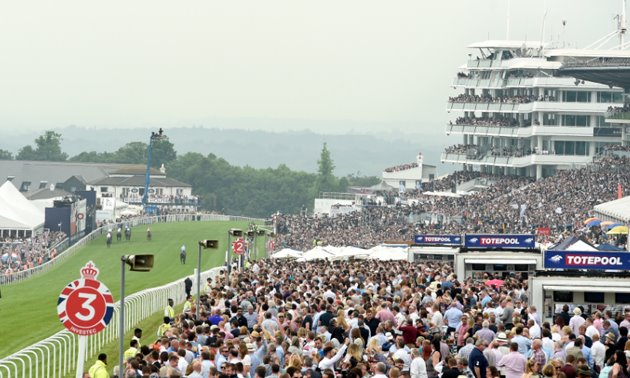‘You have broken world records and you have established personal bests. Some of you have even soared like an eagle.’ Speaking at the closing ceremony of the 1988 Winter Olympics, committee president Frank King singled out the surmounting spirit of a certain Michael Edwards, better known as Eddie. Straight after those Calgary games, feeling none of the love and all of the embarrassment, the ski jumping establishment rewrote the entry requirements, so that no Eddie ‘The Eagle’ Edwards character could ever again shine a positive light of power and publicity on such a dull and discriminative sport.
The Diore Lia saga that derailed the Derby for a while last week had all of the shame and none of the romance of the Eddie The Eagle story. The charity angle was like a transparent mask that couldn’t disguise the face of facts that Diore Lia was a vanity runner, pure and simple. What the BHA should have done was put the ball in the owner’s court by removing the filly but repaying the costs into the charity, and what the BHA must do now is take a lead from the ski jump schemers and put some ratings roadblocks in place, to prevent, to paraphrase Ryan Moore, tractors from turning up to a Grand Prix.
The Derby has standards, you know. The standard of an average Derby winner is around 125 on the Timeform scale. None of the contenders were near that going into Epsom this year, and the free-for-all feel manifested as an unusually big field for the classic. Quantity doesn’t equal quality in the Derby, and the two biggest fields resulted in the two worst winners of recent times, 18 lining up in the year of Sir Percy (119) and the maximum of 20 taking part in 2003 when Kris Kin won it with 122.
The Derby winner of 2017 is rated higher than those two, but not by much. He wasn’t an outsider of Eddie The Eagle proportions, but at 40/1 Wings of Eagles had only two of the 18 behind him in the betting, perhaps reflecting his perceived position within the six-strong Ballydoyle squad, based on riders, as on pre-race ratings he was slap, bang in the middle of the spectrum, not needing to peer too high to see the top of the squashed pile.
He who laughed last laughed loudest in the Derby, as Wings of Eagles charged late – after twice meeting trouble in the straight – to upstage and upset the trio at the top of the market, who each raised their game appreciably in line with the occasion, and the stamina test. In ski jumping terms, Cliffs of Moher (123), Cracksman (122+) and Eminent (121) did what silver, bronze and copper (?) medallists normally do in a Derby, and Wings of Eagles didn’t break any Olympic records in out-jumping them for gold, now rated 124p.
The intricacies of pace and positioning, on the face of it, heavily influenced the result of the Derby, though Simon Rowlands expertly cut through confusion in his Sectional Debrief, concluding that the finishing order was, on the whole, a true reflection on the day of these horses’ developing abilities. But developing is the key word, and none of the principals are fully formed just yet. They have a way to go to match the ratings of the best Derby winners since the turn of the century, with Workforce, Authorized and Galileo all hitting the heady heights of 132 at Epsom.
What the Derby lacked in star quality, it compensated in part with its strength in depth. The French Derby didn’t have the same depth, but it had almost the same strength at the top end, Brametot and Waldgeist going away at the end to record ratings – 123p and 122 respectively – that, in theory, would have put them right in the mix at Epsom. We are, of course, dealing in very different trips, the Prix du Jockey Club distance reduced to ten from twelve furlongs in 2005, but they’ll be swimming in the same waters all the more from now on, and the headline is that the best of the French three-year-old middle-distance colts are shaping up to be every bit as good as their British and Irish counterparts, albeit at a level that’s not that high in historical terms. It will be put to the test soon enough, as the Irish Derby is a likely battle ground for Wings of Eagles and Waldgeist.
In terms of tackling their elders in the open Group 1s in the second half of the season, they’ve got their work cut out. In fact, they’d have their hands full with a certain three-year-old filly. While the Derby and the French Derby were a matter of fine margins, the gaps between the first four in the Oaks were five, six and three-and-three-quarter lengths, all because of Enable.
All the data out of Friday’s Oaks at Epsom, from the historical and pre-race standards to the timefigure and sectional splits, calculates Enable as having run to 124 in leaving Rhododendron (116 performance figure, 3 lb lower than her Guineas effort) and the rest for dead in the finish. It’s almost unheard of for the Oaks winner to achieve the same rating as the Derby winner, but that’s the evidence from two well-run classics which showcased their respective talents to the full.
In receipt of a 3 lb fillies allowance, Enable ought to be favourite to beat any of the primary players from either the Derby at Epsom or its French equivalent. It’s controversial, but it’s calculated, and it highlights the power of Enable, right up there with Sariska and Ouija Board in terms of the best Oaks-winning ratings of recent times.
It’s taken John Gosden a little longer to work his magic with another filly, the four-year-old Laugh Aloud, but her rating out of an explosive display in the Princess Elizabeth at Epsom (up 4 lb to 120) now marks her out as a potential Group 1 contender against her own sex, though before then she’s got her sights on the Group 2 Duchess of Cambridge at Royal Ascot, where she’ll take some beating, in both the race itself and the ‘banker’ indices in the build-up to the big week.
Also booking his Royal Ascot ticket at Epsom was De Bruyne Horse, whose Woodcote win earned him the assessment of 104p and the accolade of joint-second best juvenile seen out in Britain and Ireland so far. But the biggest wave in the two-year-old division emanated from Musselburgh, where It Don’t Come Easy and Rebel Assault raced ten lengths clear of their hapless opponents in a very fast time; so fast that it lowered the course’s juvenile record that had stood since 1994.
The former, now rubbing shoulders with De Bruyne Horse on 104p, earned a crack at the Windsor Castle, and Rebel Assault (103 from 95p) had her Queen Mary ambitions fostered if anything, despite defeat. Musselburgh minor events aren’t supposed to be the lift off on the ski jump to Royal Ascot, but blokes in glasses from Cheltenham weren’t supposed to enchant the world by finishing last at the Winter Olympics.






















.jpg)


 Url copied to clipboard.
Url copied to clipboard.




.jpg&w=300)
.jpg&w=300)
.jpg&w=300)
.jpg&w=300)
.jpg&w=300)
























